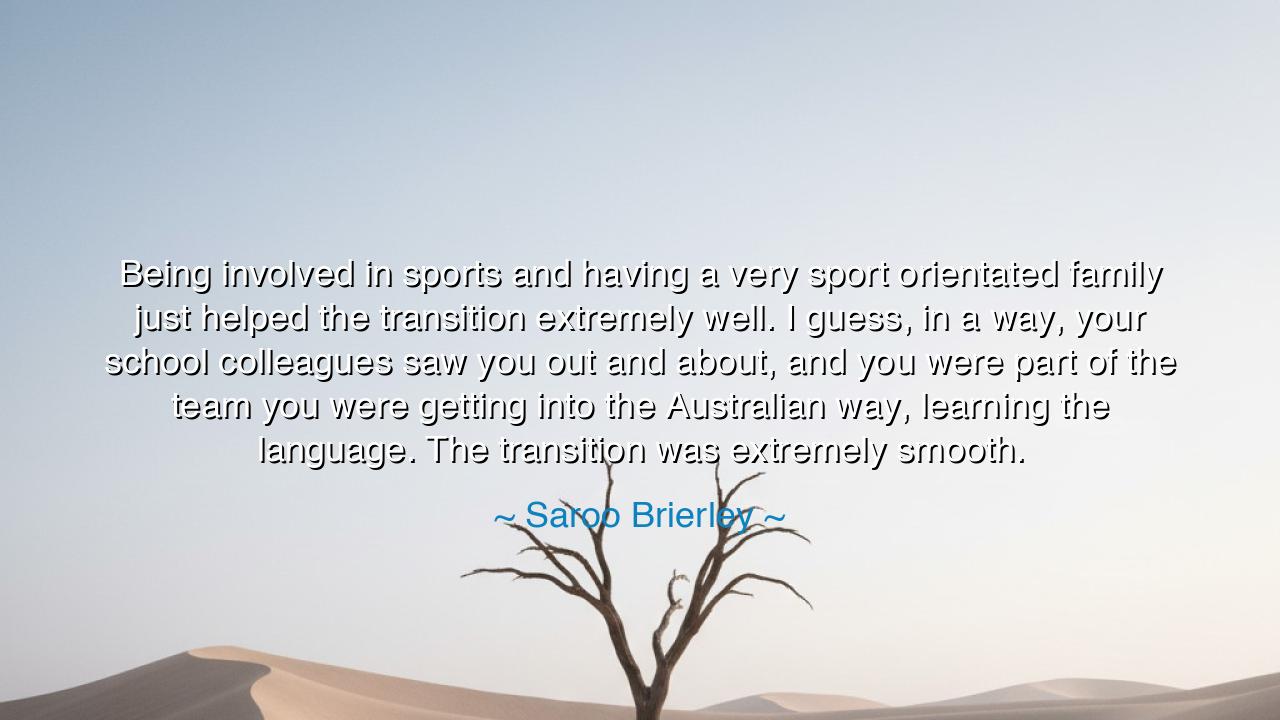
Being involved in sports and having a very sport orientated
Being involved in sports and having a very sport orientated family just helped the transition extremely well. I guess, in a way, your school colleagues saw you out and about, and you were part of the team you were getting into the Australian way, learning the language. The transition was extremely smooth.






Hear the pilgrim speak with gratitude for ordinary miracles: “Being involved in sports and having a very sport orientated family just helped the transition extremely well. I guess, in a way, your school colleagues saw you out and about, and you were part of the team—you were getting into the Australian way, learning the language. The transition was extremely smooth.” In these words, Saroo Brierley names a bridge woven of sweat, laughter, and shared rules. He tells us that a ball passed from hand to hand can carry a heart across oceans; that a field chalked with lines can become a map back to belonging. The chant from the sidelines becomes a new lullaby; the jersey, a second skin; the scoreboard, a grammar in which a newcomer learns to speak.
The ancients would recognize this rite. Tribes once welcomed strangers at the fire with trials of skill—throw the spear, run the circle, dance the steps. Not to exclude, but to knit. Sports are our modern fire-ring: here the body learns the customs, the mouth learns the cheers, the ear learns the cadence of jokes. In a sport orientated family, the rituals come daily and kindly—Saturday games, muddy socks, the long drive home with stories. The heart, overheated by fear of not-belonging, cools under the shade of routine.
Notice the gentle power in being seen “out and about” by school colleagues. Isolation invents rumors; visibility invites friendship. When classmates glimpse you hustling on the wing, breathing hard under the same sun, they see not your accent but your effort. A team is a grammar for trust: you pass, they run; they pass, you finish. Words come later. Even learning the language is steadied by motion—names shouted in a drill, idioms soaked up on bus rides, nicknames traded like talismans. The mind follows where the body has already shaken hands.
Consider the story behind the speaker. A boy lost in one hemisphere found a home in another, carrying a past that language could not immediately carry. But sports ask first for feet, not sentences; for listening eyes, not polished diction. In that mercy, the transition found handholds: a coach’s nod, a teammate’s grin, the quick geometry of play that needs no translator. And in time, the words arrived to clothe the feelings that the field had already welcomed.
History bears witness to this alchemy. In cities where newcomers gathered with the old, clubs and community leagues became quiet embassies. A pick-up game turned enemies into rivals and rivals into friends. The Australian way—fair play, show up, have a go—entered the bones before it entered the tongue. The anthem was not only sung; it was sprinted, tackled, high-fived, and iced with shared water bottles beneath a fierce sun. Thus do nations renew themselves: not merely through policy, but through play.
What, then, is the marrow of this saying? That identity can be learned at full stride, that dignity is easier to hold when both hands are already catching the ball. Transition is not only paperwork; it is choreography. The field teaches timing, the locker room teaches humor, the season teaches patience. By the time grammar lessons begin, the deeper lesson has already rooted: “I am one of us.” And when that roots, the transition indeed feels extremely smooth, not because it lacked hardship, but because friendship carried part of the weight.
Carry from this a clear rule and a simple plan. Make sports and shared activities into bridges on purpose. If you are welcoming a newcomer: invite them to practice, learn their name well, choose drills that pair veterans with novices, and let kindness be louder than speed. If you are the newcomer: show up early, volunteer for the plain tasks, listen with your eyes, and let your effort speak where words hesitate. Schools and cities: fund open leagues, equip teams that mix ages and backgrounds, train coaches in cultural humility, and celebrate “most supportive player” alongside “most valuable.” Do these things faithfully, and you will find what Saroo found—that a pass, a cheer, a bus ride, and a shared sweat can turn foreign soil into home, and make the long transition not only possible, but beautifully smooth.






AAdministratorAdministrator
Welcome, honored guests. Please leave a comment, we will respond soon